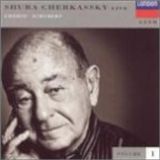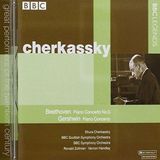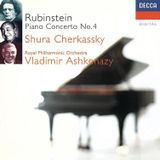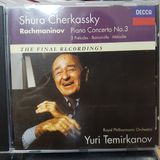"Some people like my playing and some don't, but nobody can say that I'm boring."
Many critics pigeon-holed Cherkassky as the last survivor of the late romantic piano school. Born in Odessa in 1909, he escaped the Russian Revolution with his parents, moving to America at the age of 11, where he became Josef Hofmann's last and most successful pupil.
Cherkassky himself grew tired of being classified as "a tired old relic," and was anything but. He had a huge repertoire ranging from Lully to Ligeti and his playing was always fresh and full of individualism. He loved being on stage, and even in his 80s took to the concert platform with an almost child-like glee. "I don't belong to any tradition. I don't have a method, I'm just myself. I play through intuition. I live by intuition. I'm unpredictable and I'm not going to change."
How does one sum up one of the greatest pianists of the 20th century? I was lucky to interview Cherkassky twice and saw him perform several times here in Australia, and in 1994 in the UK, the year before he died. Cherkassky had a white-hot technique, a superb touch, and a singer's sense of phrasing. He was quixotic and unpredictable as he said, and never played the same way twice. For me this was his magic; the imagination and spontaneity of his playing was breath-taking.
Because he didn't like playing a piece the same way twice he could be an erratic performer and there were times when interpretative experiments went awry. But fans went to his recitals expecting he'd offer them something unusual. "I think part of my success is that I look small, so when I come out onstage, people say: 'Oooh, is he going to play? He looks like such a shy, little man.' And then I play with authority. The contradiction is kind of a shock to the audience."
He had energy to burn too and unbelievable stamina. His recital programs regularly exceeded three hours and when he first toured Australia in 1928 as a child prodigy, he played upwards of 9 recitals in each city!
Cherkassky was also the master of the encore. As Stephen Hough, a big admirer, wrote, “confections such as Hofmann's Kaleidoscope and Morton Gould's Boogie Woogie Etude are tossed off with the confidence and dexterity of a master pastry chef."
Like many great artists he shone in live concerts and found the recording studio too inhibiting, though he had one of the longest recording careers in the history of the art form. He made early piano rolls for Duo-art in the 1920s, 78s and then LPs, and finally many live recordings for Decca in the last 25 years of his life. "I need an audience. Even as a child prodigy living in New York when my parents wanted me to play for guests I couldn't play. I had to have a proper audience."
In his 80s he was still giving upwards of 90 concerts a year and never reduced his arduous practice routine. "All the compliments in the world, will never turn my head."
"Child prodigies can be very gifted but what happens later on. I survived. I am one of the very few survivors."
Alexander Isaakovich Cherkassky was born in Odessa when it was part of the Russian Empire. His father was a dentist who taught him to read music at an early age and his mother Lydia was his first piano teacher. She had once played for Tchaikovsky in St Petersburg. "She could have had a big career, but she practised too much and got neuritis. So I'm very keen on massage and exercise, especially swimming."
Cherkassky was a child prodigy and their only child. When he was 5 he composed a 5-act opera and at 10 he conducted an orchestra. "My mother told me that the street trolley made a sound and I went to the piano and imitated it with the right notes. Then I picked up pieces quickly that my mother's pupils were playing. Child prodigies can be very gifted but what happens later on? I am one of the very few survivors."
He said he never wanted any brothers and sisters. "I remember when my mother told me she was having a child after me (she eventually had a miscarriage) I was livid. I was jealous. I didn't want a sibling."
Cherkassky had strong memories of the cold and the famine in his childhood in Russia and narrowly missed being shot on the family balcony. "We had relatives in Baltimore so we were able to leave Bolshevik Russia in 1922."
"Hofmann was a child prodigy too and understood when you're a child and you play for the public, it becomes second nature for the rest of your life."
In America, Cherkassky's ambitious parents (who had altered his passport birthdate in order to prolong his years as a child prodigy) organised for him to play for Paderewski, who declared the little boy 'a genius’. He was also invited by Rachmaninov to play for him in New York. "He thought I was a great talent but at that age I was too young to give concerts. He also wanted to alter my entire technique, but my parents and the local manager didn't agree. They wanted a second opinion." So Cherkassky played for Josef Hofmann in Philadelphia, a pupil of the great Anton Rubinstein. "He said 'No, to the contrary, you must keep playing and studying at the same time.’"
Cherkassky never regretted the decision to study with Hofmann at the Curtis Institute. "Much as I absolutely worshipped Rachmaninov, Hofmann was a child prodigy too and understood when you're a child and you play for the public, it becomes second nature for the rest of your life."
"Hoffman said if you can't do it in four hours, you can't do it."
Cherkassky was always coy about what Hofmann taught him during the years they worked together. "I can't quite say. Pedalling, dynamics, general vibrations. I learned an awful lot. My teacher was a maniac about bringing out inner voices. For the time being that was alright but I outgrew that. I was criticised then that I lost my individuality, but when you study with someone like that at the age of 11, it stays with you for the rest of your life."
His practice routine never changed. "In life I'm extremely predictable; even calculating. If I say I'm going to practise 4 hours it's not going to be 3 hours and 59 minutes, it's going to be 4 hours. Otherwise I couldn't accomplish things. I'm embarrassed to be overheard practising before concerts. Several times people have thought I'm the piano tuner. A finger mustn't visibly overlap a neighbouring note. If it does, I repeat all over again."
Cherkassky studied with Hofmann until 1938, fitting lessons around his extensive concert tours. But the arrival of the second world war put his career on hold. By now he was living in California, where he appeared in the Hollywood Bowl with conductors like Stokowski, and he played Beethoven on the soundtrack of the Bette Davis Film Deception in 1946. But concert engagements were infrequent and Americans regarded his style as out of date and sentimental. He also had to look after his beloved mother.
"She thought she was marrying an artist, but got a metronome instead."
In 1946 he married for the first and only time. His wife was his manager, Eugenie Blanc. "Everybody was doing it." Two years later she filed for divorce. "My wife was very bossy because she thought she knew all the answers. She thought she was marrying an artist, but got a metronome instead."
This was a reference to what Cherkassky called "my extreme predictability in life." His health was something of an obsession and eating and sleeping were highly regulated.
"I calculate for instance there are 7 days in a week, so 2 days I'm on a very strict non-fattening diet, 1 day I don't eat at all, just unsweetened juices and black coffee, the other 4 days I let myself go. People say 'why do you do it like that? Why don't you do it in moderation?' I can't and if anyone would disturb my ways of living…"
When making recordings he liked to have a plate of carrots nearby to chew. "And when I give a concert, whether I feel like it or not, I need to use my bowels. I force myself because otherwise I won't play well."
"I never smoked or drank and eat lots of yoghurt. If there is a drop of alcohol in food, I feel it will bring evil to my life." (Hofmann became an alcoholic.)
"The whole world is there."
After the war, Cherkassky got a big break in Europe after a sensational performance of the Rachmaninov Paganini Variations in Hamburg. Audiences embraced him as the heir apparent of Rubinstein and Hofmann.
After his Wigmore Hall recital in 1957, his career took off in the UK too, and following the death of his mother (they'd been living together for some years in Nice) he made his last move to London which he loved. "The whole world is there."
Mid-career he developed a reputation for being notoriously wayward. Some conductors actively avoided playing concertos with him as his approach to a work would often change radically from rehearsal to performance. "They say every evening I play like a different person and it's true, some conductors don't like it. 'Why do you play in the rehearsal one way, and then surprise us in the performance?’ I don't know, it's something in me I can't explain, but actually it's very exciting for the audience, not the critics. Though they blame me for it, but they also say it works." He did work successfully with many of the greats including Karajan, Kempe, Solti and Rostropovich, though not regularly.
"I don't know why they like me now. Probably because all the others are dead."
In the last two decades of his life Cherkassky enjoyed a cult status, especially in Japan, the UK and America, where audiences rediscovered him through his many recordings.
His prodigious career continued right up almost to his death. For his 80th birthday he took on a huge world tour giving recitals in every major capital of Europe as well as visits to America and the Far East. He gave recitals in Melbourne and Sydney in 1992, returning to the Sydney Town Hall more than 60 years after he first played there.
He lapped up the attention the tours brought him, commenting wryly: "I don't know why they like me now. Probably because all the others are dead." He kept up a hectic schedule until just a month before his death in 1995.
"His was the kind of playing that leaves a huge impression. That means something."
Listening to his recordings this week, strong memories of my encounters with Cherkassky come flooding back. The first time was in Sydney in June 1987 when he had recalled his very first international tour to Australia in 1928 as a child prodigy. He remembered the Australia Hotel, where he stayed, didn't have running water in his room. He avoided talking about music and musicians and his own approach to the piano. "It bores me," he replied.
In 1992 I visited him at his London 'home': an apartment in the extraordinary condominium called The White House. There were no books, nothing on the walls, it was all rented hotel furniture. Even his Steinway grand was rented. But I do remember a cast of Rubinstein's hand on the piano, which he'd been given by Hofmann's widow.
"I don't crave a lot of possessions. Even in London I live in a serviced apartment. I have abnormal impatience. If I press room service the coffee has to arrive. I do everything by the clock. If I did it any one way I wouldn't enjoy it."
My last memory was one of his last concerto performances in Manchester in 1994 of his beloved Anton Rubinstein's Piano Concerto No. 4, which he recorded shortly after in the studio with Vladimir Ashkenazy conducting. His very last studio session was a handful of short pieces of his hero Rachmaninov.
"I saw Rachmaninov play several times. He was marvellous. His was the kind of playing that leaves a huge impression. That means something. Everyone plays correct notes today but most of them play alike. It's all fine but then you come out, and you forget. I prefer someone to impress, even if it's wrong."
Mairi Nicolson presents Lunchtime Concert, The Opera Show and Sunday Opera on ABC Classic.






